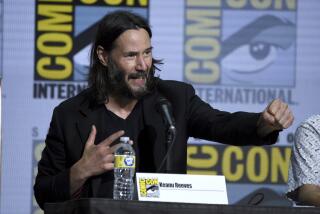Movie review: âHereafterâ
Death is the barrier we canât get around, an eternal void burdening those among the living who yearn for those who are gone. What would it mean if we could communicate with the other side, or even just be sure it existed?
That is the theme of the haunting âHereafter,â the latest work from Clint Eastwood, which presents a trio of stories having to do with what might be on that far side and how it relates to the world we know.
Over the years, Eastwood has very much become a director we expect to deliver the unexpected, and heâs done that here. Hollywood once upon a time made films exploring these kinds of issues, but in todayâs climate only a filmmaker like Eastwood, determined to never do the same thing twice, would have the nerve and the clout to take it on.
Though its subject matter is unusual, the compelling thing about âHereafterâ is the way it places spiritual themes squarely in the kind of Hollywood context that attracts stars like Matt Damon and top Belgian actress CĂŠcile de France. Whatâs surprising and satisfying about this film are its determination to deal with unconventional material in a classical way.
âHereafterâ was also a departure for screenwriter Peter Morgan, best known for fact-based stories like âFrost/Nixonâ and âThe Queen.â He apparently wrote the script after the death of a friend and, because it was so out of the ordinary for him, put it away for years.
Morganâs script turns out to be a fine match for Eastwoodâs fluid, unassuming directing style. His direct, unadorned approach pares everything down to its essence, the better to express the core of the narrative in the most direct and effective way possible. This is quiet but potent filmmaking that believes nothing is more important than the story it has to tell.
Actually, it is three stories that are told, and âHereafterâ begins by providing a wonderful sense of uncertainty, giving us the gift of not knowing where these tales are going and whether or not they will have things in common besides dealing with death and the beyond. Like the similarly affecting âNever Let Me Go,â âHereafterâ is best approached with as little specific information as possible.
The first story introduces us to a French couple, unmarried lovers and professional colleagues, vacationing in Indonesia. Marie (De France, who appeared in âMesrineâ) is a journalist who leaves her napping companion to get some last-minute shopping done.
This small excursion takes a nightmarish turn when, in a formidable piece of special effects work â orchestrated by visual effects supervisor Michael Owens, effects house Scanline and editors Joel Cox and Gary Roach â Marie gets caught in a monstrous tsunami.
Eastwoodâs team makes this wall of water and Marieâs near-death experience in it so convincing that it canât help but be deeply disturbing to watch, giving us more of a sense of what being trapped in a tsunami would actually be like than we may want. So itâs easy to believe that once Marie returns to Paris, she finds herself disturbed by what happened and her glimpse of the beyond.
Next up is Matt Damonâs George, a blue-collar guy who operates a forklift in San Francisco and yearns for a normal life. For it turns out that George, rather like the Bibleâs Jonah, is a man fleeing from his calling. In a world of fakes and frauds, he is the genuine article, a psychic who is very much for real and gets authentic messages from the other side.
But having the kind of gift that leads frantic people to invade your life day and night can be a terrible burden, especially when George meets a cute young woman ( Bryce Dallas Howard) he thinks of getting serious about. As he himself says, âA life thatâs all about death is no life at all.â
The filmâs third story is set in London and involves a set of identical twin schoolboys (George and Frankie McLaren) who run interference for their substance-abusing mother. Something happens in this family that demonstrates how the desperate need to communicate with the departed can take over the lives of those still living.
âHereafterâ cuts back and forth among these three stories in an increasingly gripping way. Especially involving as always is Damon, convincing as an everyman torn by the kinds of conflicts few people have to deal with. Can peace be made between the here and the hereafter? Itâs a question that canât be answered, but few directors have the ability to explore the possibilities as gracefully as this singular filmmaker approaching in his 80th year.
More to Read
Only good movies
Get the Indie Focus newsletter, Mark Olsen's weekly guide to the world of cinema.
You may occasionally receive promotional content from the Los Angeles Times.











